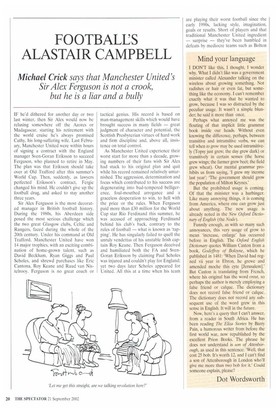Mind your language
I DON'T like this, I thought, I wonder why. What I didn't like was a government minister called Alexander talking on the wireless about growing something. Not radishes or hair or even fat, but something like the economy. I can't remember exactly what it was that he wanted to grow, because I was so distracted by the peculiar usage. It wasn't a simple blunder; he said it more than once.
Perhaps what annoyed me was the flouting of that implicit little grammar book inside our heads. Without even knowing the difference, perhaps, between transitive and intransitive verbs, we can tell when to grow may be used intransitively (Topsy just grew; the day grew dark) or transitively in certain senses (the horse grew wings; the farmer grew beet; the field grew wheat). Our mental grammar prohibits us from saying, 'I grew my income last year"; 'The government should grow the population of Milton Keynes.'
But the prohibited usage is coming. Of that the minister was a harbinger. Like many annoying things, it is coming from America, where one can grow just about anything. The new usage is already noted in the New Oxford Dictionary of English (the Node).
Funnily enough, as with so many such annoyances, this very usage of grow to mean 'increase, enlarge' has occurred before in English. The Oxford English Dictionary quotes William Caxton from a book, Godeffroy of Boloyne, which he published in 1481: 'When David had regned vii year in Ebron, he grewe and amended moche this elite [Jerusalem]: But Caxton is translating from French, where his original has the word creut, so perhaps the author is merely employing a false friend or calque. The dictionary does not record false friend or calque. The dictionary does not record any subsequent use of the word grew in this sense in English. It will in the future.
Now, here's a query that I can't answer, from a reader in South Africa. He has been reading The Eliza Stories by Barry Pain, a humorous writer from before the first world war, now republished by the excellent Prion Books. The phrase he does not understand is son of Attenborough, as used in this sentence: 'Well, that cost 25 bob. It's worth 12, and I can't find a son of Attenborough in London who'll give me more than two bob for it.' Could someone explain, please?
Dot Wordsworth










































































 Previous page
Previous page